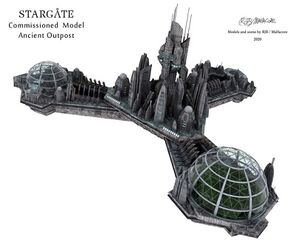| Antecanis Terminal | ||||||||||||||||||

| ||||||||||||||||||
| Antecanis Terminal | ||||||||||||||||||
| ||||||||||||||||||
Antecanis Terminal is a cutting-edge facility perched above the turbulent ocean world of the Antecanis Ceti Major Star System. Serving as a critical outpost for Solas Tempus, this strategically vital station is distinguished by its unique aquatic architecture and specialized technologies. Central to the station's importance is the Hermod Gate, an indispensable component of Antecanis Terminal. Functioning as a dimensional portal, the Hermod Gate enables swift transportation and communication between the station and various locations throughout the multiverse. This gateway facilitates the seamless deployment of Solas Tempus personnel and resources, acting as a vital link for interdimensional operations, enabling rapid response to emerging threats, and fostering diplomatic relations with other realms.
Research Projects
- Oceanic Biodiversity and Ecosystem Analysis
- Given the vast and unexplored ocean, a primary research project at Antecanis Terminal revolves around studying the planet's oceanic biodiversity and understanding its complex ecosystem. Scientists are engaged in cataloging marine species, analyzing their behaviors, and investigating their adaptations to the extreme conditions of Antecanis' ocean. This project aims to unveil the intricate relationships within the ecosystem and assess its potential for sustainable resource utilization.
- Hydrothermal Vent Exploration and Extremophile Research
- The ocean floor is riddled with hydrothermal vents, creating unique environments teeming with extremophile organisms. Researchers at Antecanis Terminal are dedicated to exploring these vents and studying the resilient lifeforms that thrive in their extreme conditions. Through submersible expeditions and sample collection, scientists seek to understand the biological and chemical processes occurring within these vents and uncover potential applications for extremophiles in various fields, including medicine and biotechnology.
- Oceanographic Modeling and Climate Impact Assessment
- Antecanis Terminal serves as a vital hub for monitoring and modeling the ocean currents, temperature fluctuations, and overall climate patterns. Scientists utilize advanced oceanographic modeling techniques to simulate the planet's oceanic behavior and assess the potential impact of external factors, such as solar radiation and volcanic activity.
History and Key Personnel
Antecanis Terminal, established five years ago, has a brief but impactful history. Its creation stemmed from a partnership between the Hermod Consortium and Solas Tempus, solidifying a robust foundation for its operations and the selection of a proficient command crew. Let's delve into the key personnel:
- Commanding Officer
- Dr. Anya Petrova, a renowned marine biologist, was appointed by Solas Tempus to lead Antecanis Terminal as its Commanding Officer. With her extensive knowledge of oceanic ecosystems and strong leadership capabilities, Dr. Petrova provides unwavering guidance to the station's research endeavors. She oversees scientific projects, manages resources, and ensures effective communication with Solas Tempus headquarters. Dr. Petrova's expertise and passion for marine science are instrumental in driving the station's success.
- Executive Officer
- Commander Kai Tanaka is the Executive Officer of Antecanis Terminal. Commander Tanaka was chosen for his exceptional project management skills and experience in underwater operations. He assists Dr. Petrova in managing the station's administrative affairs, coordinates personnel activities, and ensures the smooth execution of research missions. Commander Tanaka's meticulous approach and dedication to safety are crucial in maintaining the station's operational efficiency.
- Station Master Systems AI
- Nereus, an advanced artificial intelligence named after the Greek god of the sea, serves as the station's Master Systems AI. Nereus oversees the intricate network of interconnected systems and technologies that sustain Antecanis Terminal. This sophisticated AI manages environmental control, security protocols, communication networks, and resource allocation. Nereus' ability to adapt and learn from the vast amounts of data collected at the station significantly enhances operational efficiency and optimizes research processes.